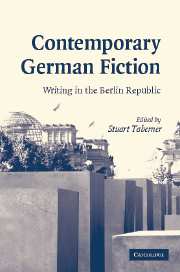Book contents
- Frontmatter
- Contents
- List of contributors
- Acknowledgments
- Note on texts and terminology
- 1 Introduction: literary fiction in the Berlin Republic
- 2 Literary debates and the literary market since unification
- 3 Berlin as the literary capital of German unification
- 4 ‘GDR literature’ in the Berlin Republic
- 5 ‘West German writing’ in the Berlin Republic
- 6 Literary reflections on '68
- 7 Pop literature in the Berlin Republic
- 8 Representations of the Nazi past I: perpetrators
- 9 Representations of the Nazi past II: German wartime suffering
- 10 German literature in the Berlin Republic – writing by women
- 11 Cultural memory and identity formation in the Berlin Republic
- 12 Turkish-German fiction since the mid 1990s
- 13 German-language writing from eastern and central Europe
- 14 Writing by Germany's Jewish minority
- Index
14 - Writing by Germany's Jewish minority
Published online by Cambridge University Press: 22 September 2009
- Frontmatter
- Contents
- List of contributors
- Acknowledgments
- Note on texts and terminology
- 1 Introduction: literary fiction in the Berlin Republic
- 2 Literary debates and the literary market since unification
- 3 Berlin as the literary capital of German unification
- 4 ‘GDR literature’ in the Berlin Republic
- 5 ‘West German writing’ in the Berlin Republic
- 6 Literary reflections on '68
- 7 Pop literature in the Berlin Republic
- 8 Representations of the Nazi past I: perpetrators
- 9 Representations of the Nazi past II: German wartime suffering
- 10 German literature in the Berlin Republic – writing by women
- 11 Cultural memory and identity formation in the Berlin Republic
- 12 Turkish-German fiction since the mid 1990s
- 13 German-language writing from eastern and central Europe
- 14 Writing by Germany's Jewish minority
- Index
Summary
Since the late 1980s, and especially continuing after German unification in 1990, there has been a veritable renaissance in German-Jewish literature by writers born after the Holocaust. This flowering of literature by Jews who either live in Germany or write in German has prompted some critics to posit the question as to whether one can view these developments as the resurrection of the old dream of a ‘German–Jewish symbiosis’. The notion of a symbiosis, which dominated discourse on Germans and Jews in the first half of the twentieth century, holds that the interaction betweens Jews and the greater German society in which they lived might result in mutual improvement: German culture might be enriched by its Jewish minority, while Jews in Germany might participate fully in German society and at the same time express their Jewish identity. After the Holocaust, Jewish intellectuals took a hard look at this old dream and declared it to be largely mythical; Gershom Scholem claimed that the notion of a symbiosis was a self-deceptive monologue among Jews never attended to by a German audience, while Dan Diner characterised the post-war relations between Germans and Jews as a ‘negative symbiosis’ in which the two groups were joined together in ‘a kind of communality of opposites’. But the new wave of German-Jewish writing that emerged in the 1980s and 1990s, led by writers such as Barbara Honigmann, Esther Dischereit, Maxim Biller, Katja Behrens and Rafael Seligmann, seemed to indicate a sea change in the participation of Jews in German culture, giving rise to the hope for a re-establishment of a symbiotic connection and, with that, the normalisation of relations between Germans and Jews in the Berlin Republic.
- Type
- Chapter
- Information
- Contemporary German FictionWriting in the Berlin Republic, pp. 230 - 246Publisher: Cambridge University PressPrint publication year: 2007
- 3
- Cited by



